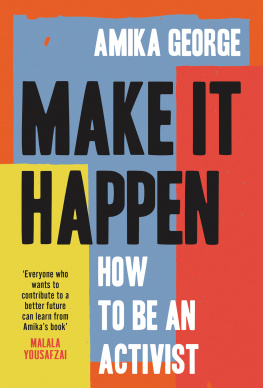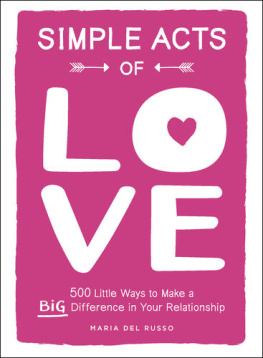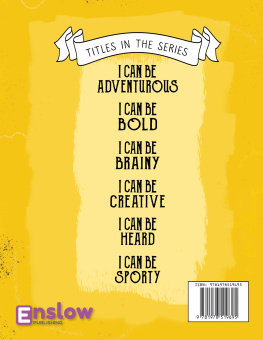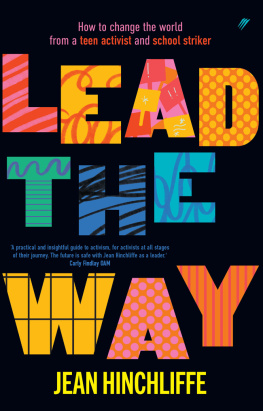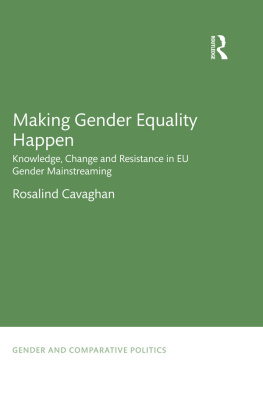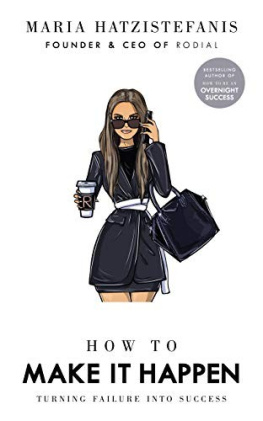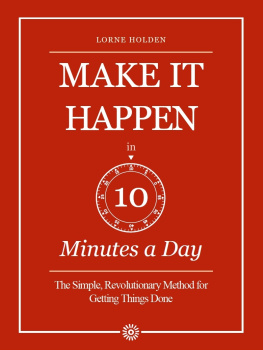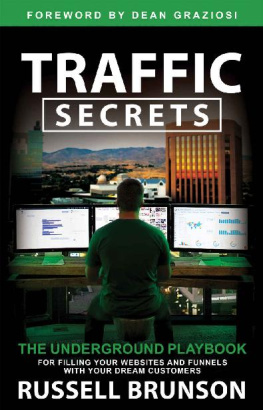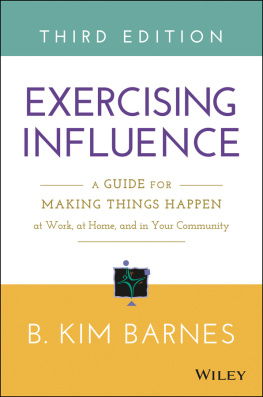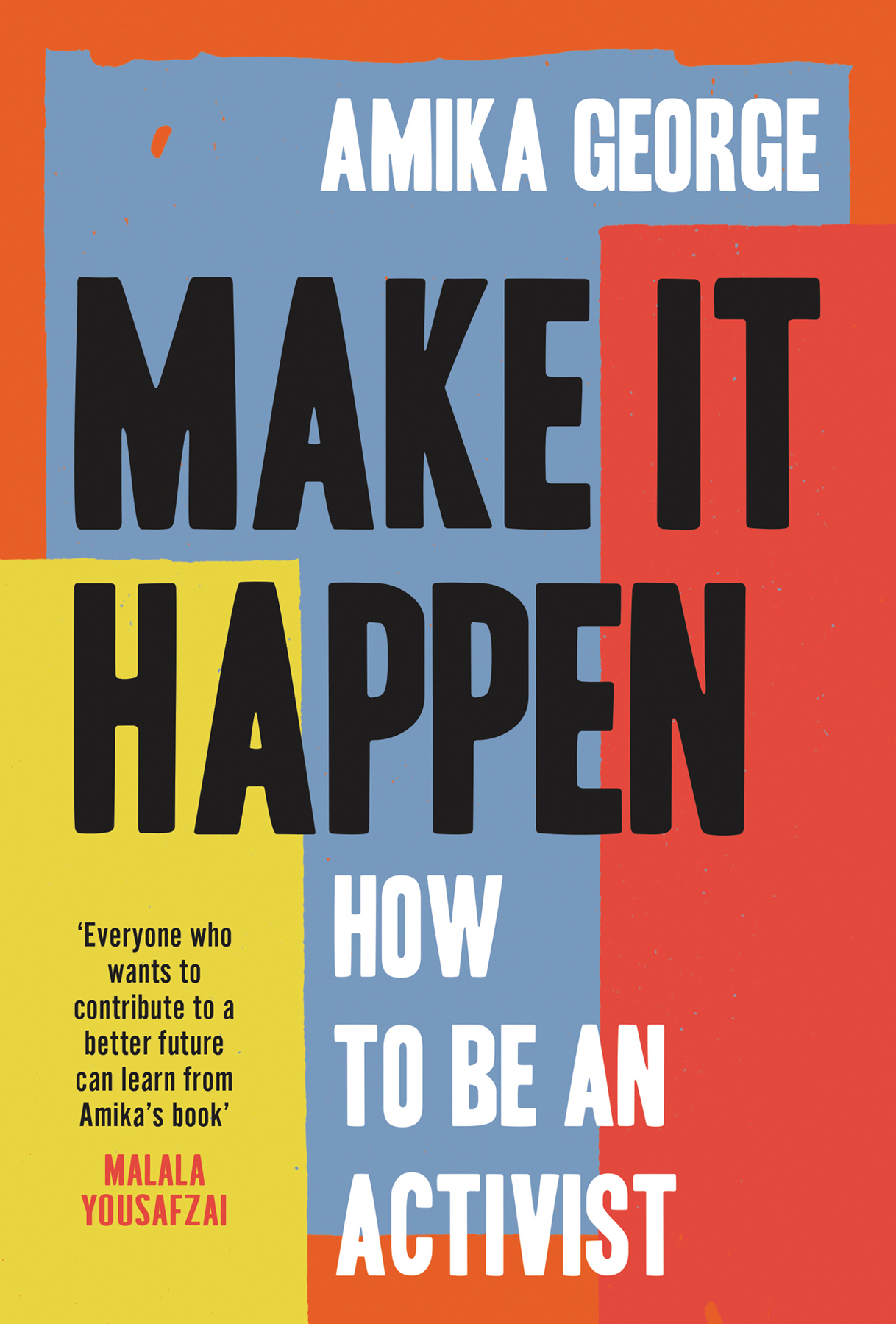Campaigning is an incredible force for good it has the power to improve peoples lives. So, if youre a young person who has an idea and wants to change the world, read this book and help make it happen.
Sadiq Khan, Mayor of London
Inspiring and practical. An indispensable handbook to changing the world.
Caroline Criado Perez OBE, author of Invisible Women
A personal, powerful, passionate, pragmatic, punchy book from one of Britains most exciting Gen Z activists. A great guide to moving and shaking with joy, spirit and real world results.
Deborah Frances-White, creator and author of The Guilty Feminist
Amika George is a credit to her generation and makes me feel so much better about the future. Her tireless campaigning to make period poverty a thing of the past in the UK has helped millions of girls, the social and economic benefits of this will be seen for many years to come. Im delighted to see that she has put her passion into words.
June Sarpong OBE, broadcaster and presenter
Amika George is one of my favourite people on earth she embodies why the world is so excited for generation Z! Make it Happen is an inclusive, powerful, political, intelligent and brilliant book about how one person can truly make a difference in this world. If you feel remotely fed up with the status quo, you need this book in your life!
Scarlett Curtis, writer and activist
Amika is an inspiration to us all and a personal hero of mine.
Josie Naughton, co-founder of Help Refugees
I wish Id had this book when I googled how do you change a law at the beginning of my fight to make upskirting illegal. I would have felt so supported and understood what being an activist really takes. Can we get this book on all school shelves?!
Gina Martin, campaigner and activist
This is a mad world. A world struggling through a period of grave, existential crisis. Amika and her book, Make it Happen, is the ray of light we all need to make sense of this world. To set things right. To catalyse change, to leave no one behind.
Trisha Shetty, activist and founder of Shesays
An imprint of HarperCollins Publishers Ltd
1 London Bridge Street
London SE1 9GF
First published in Great Britain by HQ in 2021
Copyright Amika George 2021
Amika George asserts the moral right to be identified as the author of this work.
A catalogue record for this book is available from the British Library.
All rights reserved under International and Pan-American Copyright Conventions. By payment of the required fees, you have been granted the non-exclusive, non-transferable right to access and read the text of this e-book on-screen. No part of this text may be reproduced, transmitted, downloaded, decompiled, reverse engineered, or stored in or introduced into any information storage and retrieval system, in any form or by any means, whether electronic or mechanical, now known or hereinafter invented, without the express written permission of HarperCollins.
Ebook Edition January 2021 ISBN: 9780008377588
Version 2020-12-11
This ebook contains the following accessibility features which, if supported by your device, can be accessed via your ereader/accessibility settings:
- Change of font size and line height
- Change of background and font colours
- Change of font
- Change justification
- Text to speech
- Page numbers taken from the following print edition: ISBN 9780008377601
To Appachan
Contents
Spring 2017
I was at the kitchen table, having breakfast before school, scrolling on my phone. Girls Too Poor to Buy Sanitary Products Missing School was one of the top stories on BBC News.
I was curious; the byline declared that a charity supplying pads to girls in Africa had been asked to divert their supplies to the UK. I clicked on the link, intrigued. The article described how the charity Freedom4Girls had been contacted by a school in Leeds after teachers started noticing some girls patterns of absence. These girls, who lived in England, girls just like me, couldnt afford to buy pads or tampons. Many of them came from families that were struggling to put food on the table. The journalist interviewed teenage girls who admitted that they would often go to school with wads of tissue paper wrapped around their underwear, hoping it would keep them dry until the end of the day. They would miss school for days every month, not wanting to risk bleeding all over their uniform. One said she was too scared to tell anyone, keeping it a secret until she finally worked up the courage to ask for help months later. Another said she was overwhelmed when she started her period. She had no idea what was happening to her body and started missing school every month. She felt isolated and alone.
I sat back in my chair and thought about what Id just read. I was outraged. Like many of us, Id heard about girls being too poor to afford period protection in other countries around the world. In fact, just weeks earlier, Id read an article in Time magazine about period poverty in India, and the impact on a girls life when she drops out of education. I remember the sadness I felt reading how, in the country in which my grandparents had grown up, 113 million girls between 12 and 14 years old were at risk of dropping out of school simply because they werent equipped to manage their period due to the shame and stigma of menstruation. Some schools, especially those in rural areas, didnt provide toilets that were safe and hygienic, with access to running water and the means to dispose of pads safely. I remember shuddering as I read about how girls used leaves, hoping they would absorb the blood. Leaves. I hadnt been able to get my head around it. School just wasnt a place for a poor girl with a period.
When my grandma came over that evening, I spoke to her about the article. I wanted to know what it had been like for her, when she was growing up in India. She laughed at the shock on my face when she told me how she would fashion her own pads from neatly folded cloth inserted into a belt, which she would hoist onto her hips in the days before disposable products were common. We spoke about the shame, so culturally embedded in a country where menstruation is considered unclean and impure.
But this felt different. This article in front of me was about girls in England. In what was one of the most prosperous countries on Earth, crippling poverty meant that girls were missing out on the education to which they were entitled. The British Government is routinely praised for upholding human rights and supporting those in need, but the injustice of students in the UK being unable to get an education because of their period stunned me. No matter how I looked at it, the injustice was overwhelming; why should periods hold anyone back from going to school, from realising their potential, and achieving their dreams?
Its not fair that anyone should be at a disadvantage simply because of their biology. How can we even come close to achieving gender equality if one of our basic needs isnt being acknowledged and met? And how could it be that no help was being offered to those who werent able to manage their period? It was as if society was dismissing them; saying they didnt matter.

